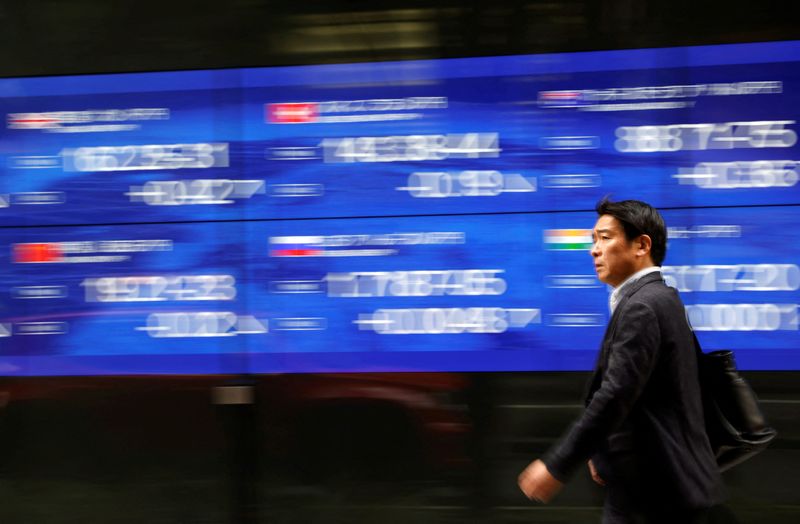By Sinéad Carew and Amanda Cooper
NEW YORK/LONDON (Reuters) - A global index of stocks fell slightly while Wall Street eked out a gain in Monday's choppy market as bond yields rose and investors continued to digest last week's central bank indications that interest rates would stay higher for longer.
The dollar hit an 11-month high against the Japanese yen and the highest in almost 10 months against a basket of currencies after the U.S. Federal Reserve last week signalled it could raise interest rates further and was likely to hold them higher for longer than investors had expected.
U.S. economic risks that Powell noted in a press conference last week included the autoworkers' strike, a possible federal government shutdown, resumption of student loan repayments, higher energy prices and higher long-term borrowing costs.
On Monday, Chicago Fed president Austan Goolsbee said inflation entrenched above the central bank's 2% target remains a bigger risk than tight Fed policy slowing the economy more than needed.
The MSCI All-World index was last down 0.05% on the day, marking its seventh consecutive decline and its longest losing streak since early Sept 2022.
Still Wall Street's three major indexes closed up slightly on Monday, providing some hope the market was steadying.
"We're potentially putting in a bottom from the correction we've had. The market's been volatile in the last couple of sessions. A lot has to do with the Fed and the focus on what the Fed is going to do," said Tim Ghriskey, senior portfolio strategist at Ingalls & Snyder in New York.
But until the third-quarter earnings reporting season, which doesn't start in earnest until October, there is "reason for the market to be stuck in neutral here," said Ghriskey.
"Earnings could be a negative but they could also be a big positive so there's some money sitting on the sidelines waiting for that," he said.
Investors are also wary ahead of the next U.S. inflation reading, which is due on Friday, and "may stay in a wait and see mode," until that is released, said Mona Mahajan, senior investment strategist at Edward Jones.
The Dow Jones Industrial Average rose 43.04 points, or 0.13%, to 34,006.88, the S&P 500 gained 17.38 points, or 0.40%, to 4,337.44 and the Nasdaq Composite added 59.51 points, or 0.45%, to 13,271.32.
The pan-European STOXX 600 index had earlier closed down 0.62%.
In U.S. Treasuries, yields were mostly higher with the benchmark 10-year yield building on three straight weeks of gains on expectations U.S. rates would stay higher for longer than previously anticipated.
Benchmark 10-year notes were up 10.2 basis points to 4.542%, from 4.44% late on Friday. The 30-year bond was last up 14.3 basis points to yield 4.6646%, from 4.522%. The 2-year note was last was up 0.2 basis points to yield 5.1249%, from 5.123%.
"The core rationale over the past couple of months has been pretty consistent in that the market continues to position itself for the 'higher for longer' type of environment," said Jim Barnes, director of fixed income at Bryn Mawr Trust in Berwyn, Pennsylvania.
In currencies, the dollar index rose 0.35%, with the euro down 0.58% to $1.059 while Sterling was trading at $1.2212, down 0.21% on the day.
The Japanese yen weakened 0.31% versus the greenback at 148.84 per dollar, sticking close to the 150-per-dollar level many traders believe could represent a line in the sand for the Bank of Japan to intervene. The BOJ last week maintained its ultra-loose monetary policy.
Governor Kazuo Ueda, in a speech on Monday, reiterated the central bank's resolve regarding interest rates and said there was "very high uncertainty" over whether companies would continue raising prices and wages.
U.S. crude oil futures settled lower while Brent was flat after choppy trade on Monday as Russia relaxed its fuel ban, after earlier gains on a tighter supply outlook, while investors eyed elevated interest rates that could curb demand.
U.S. crude settled down 35 cents or 0.39% at $89.68 per barrel while Brent ended at $93.29, up 2 cents or 0.02%.
